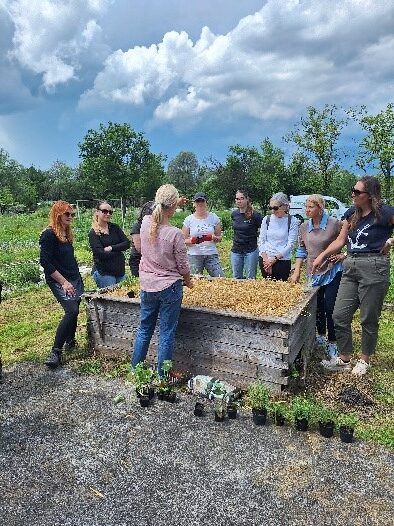Within the framework of the CoFarm4Cities project, the Municipality of Ljubljana took a slightly different path than the other partners. Because we decided to design, together with our partner DOVES, a learning process for primary schools, in which students will encounter food in several ways – from production to, processing, waste, composting…
We also designed a design project for this purpose Rakova Jelša’s mini urban farm, which will serve as a training ground for all training program providers. It will enable socializing and exchange of knowledge in one place for all involved schools.
We designed the Rakova Jelša mini urban farm as a space for the exchange of knowledge and experience in the nursery area of Rakova Jelša. To date, the municipality of Ljubljana has arranged nine garden areas where citizens can rent a garden and take care of their own food supply.
As part of the EU project CF4C, we decided to bring food production closer to even the youngest residents of our city through the learning process and the method of participation. The space that we are re-imagining will offer opportunities for education as well as for socializing and exploring the biotic diversity of the area in which it is located. Through their senses and movement, our youngest will learn the importance of local food production or local self-sufficiency.
Initially intended for education, but unused space, with the help of an organic gardener, turned into a training ground for eight pilot schools in Ljubljana. From April 2024 to today, we have arranged a training ground with five low beams, a longstretched beam and one high beam. We held the first workshop at the end of May 2024 with the mentors of the primary pilot schools, to whom we presented the importance of local self-sufficiency, our program as part of the EU project, the planting plan at the city’s urban farm, education on soil reclamation, planting seedlings, vegetables, and together we made an approximate time plan of events at the Rakova Jelša training ground. We introduced everyone to the management of the Gardening Journal and Gardening Etiquette – in the garden they will be living with the renters of the gardens. In order for the work to go as smoothly as possible, we have signed cooperation agreements with eight pilot elementary schools. The municipality of Ljubljana provided the involved schools with high beams, tools, material and seedlings. At the beginning of June 2024, the first three pilot schools acquired the first material for work in their gardens within the territory (environment) of the school base, some of the listed schools have already planted part of the beds. During the summer, the crops will be taken care of by employees of the schools.
Because we are aware that communication is the key to success, we hold regular meetings via the Zoom application and as often as possible, also live. We upload news from the projects to the common Google-drive drawer.
In the fall of 2024, we will hold the first joint meeting at the training ground for all students and mentors – a picnic at the training center for all participants. We will prepare edible meals from the grown vegetables. It will be very interesting to see what will grow over the summer.
Slovenia actually has a rich history of school gardens, but over time this rich pedagogical knowledge has been forgotten. In the second half of the 19th century, almost every school had a garden. And not just the garden: the teachers also taught the students about fruit growing, viticulture and beekeeping. In some places they even cultivated silkworms. The garden was a teaching aid in science lessons and was intended for practical lessons. Although some schools already had gardens in the first half of the 19th century, they were legislated in 1869 together with the general compulsory schooling of children. It was decided that each school should be assigned a suitable piece of land “for training in agricultural work”. This piece of land was looked after by teachers and students. The school gardens were preserved until the end of the Second World War, and in Ljubljana until the beginning of the 70s of the 20th century.
It’s time to go back again and revive old knowledge for new generations!
